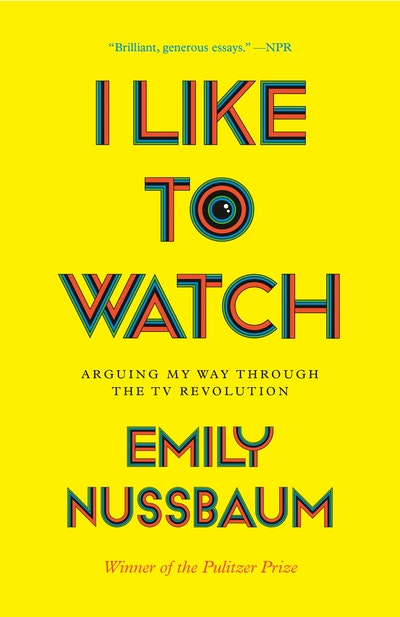From The New Yorker’s fiercely original, Pulitzer Prize-winning culture critic, a provocative collection of new and previously published essays arguing that we are what we watch.
“Emily Nussbaum is the perfect critic—smart, engaging, funny, generous, and insightful.”—David Grann, author of Killers of the Flower Moon
NAMED ONE OF THE BEST BOOKS OF THE YEAR BY NPR • Chicago Tribune • Esquire • Library Journal • Kirkus Reviews
From her creation of the “Approval Matrix” in New York magazine in 2004 to her Pulitzer Prize–winning columns for The New Yorker, Emily Nussbaum has argued for a new way of looking at TV. In this collection, including two never-before-published essays, Nussbaum writes about her passion for television, beginning with Buffy the Vampire Slayer, the show that set her on a fresh intellectual path. She explores the rise of the female screw-up, how fans warp the shows they love, the messy power of sexual violence on TV, and the year that jokes helped elect a reality-television president. There are three big profiles of television showrunners—Kenya Barris, Jenji Kohan, and Ryan Murphy—as well as examinations of the legacies of Norman Lear and Joan Rivers. The book also includes a major new essay written during the year of MeToo, wrestling with the question of what to do when the artist you love is a monster.
More than a collection of reviews, the book makes a case for toppling the status anxiety that has long haunted the “idiot box,” even as it transformed. Through it all, Nussbaum recounts her fervent search, over fifteen years, for a new kind of criticism, one that resists the false hierarchy that elevates one kind of culture (violent, dramatic, gritty) over another (joyful, funny, stylized). I Like to Watch traces her own struggle to punch through stifling notions of “prestige television,” searching for a more expansive, more embracing vision of artistic ambition—one that acknowledges many types of beauty and complexity and opens to more varied voices. It’s a book that celebrates television as television, even as each year warps the definition of just what that might mean.
FINALIST FOR THE PEN/DIAMONSTEIN-SPIELVOGEL AWARD FOR THE ART OF THE ESSAY
“This collection, including some powerful new work, proves once and for all that there’s no better American critic of anything than Emily Nussbaum. But I Like to Watch turns out to be even greater than the sum of its brilliant parts—it’s the most incisive, intimate, entertaining, authoritative guide to the shows of this golden television age.”—Kurt Andersen, author of Fantasyland
“Reading Emily Nussbaum makes us smarter not just about what we watch, but about how we live, what we love, and who we are. I Like to Watch is a joy.”—Rebecca Traister


